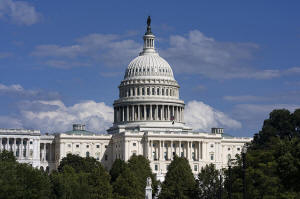Republicans are preparing to change Senate rules to speed Trump's
nominees
[September 04, 2025]
By MARY CLARE JALONICK
WASHINGTON (AP) — Republican senators say they are prepared to change
the chamber’s rules to get around the Democratic blockade of President
Donald Trump’s nominees and are discussing a proposal to make it easier
to confirm multiple nominees at once.
The Democrats' obstruction is “historic and unprecedented,” Senate
Majority Leader John Thune said after meeting with his conference on
Wednesday. “It is not something we can sustain.”
Republicans have been talking about options for changing the rules since
early August, when the Senate left for a monthlong recess after a
breakdown in bipartisan negotiations over the confirmation process.
Democrats have blocked nearly every single one of Trump’s nominees,
forcing majority Republicans to spend valuable floor time on procedural
votes and leaving many positions in the executive branch unfilled.
GOP senators discussed one proposal in a private meeting on Wednesday
that would enable them to confirm large tranches of nominees “en bloc,”
or several at once, if a majority of senators agree, according to
multiple senators who attended the meeting.
Currently, the objection of a single senator forces multiple votes on
most nominations. The rules change would likely only apply to executive
branch nominations, not lifetime judicial appointments, and would
exclude many of the most high-profile positions, such as Cabinet
nominees, that require a longer debate time.
The rules change would require several floor votes and the support of a
simple majority, so at least 51 out of the chamber's 53 Republicans. But
most GOP senators appear to be on board.

“Expect us to move forward with a plan that would enable us to clear the
backlog of nominees,” Thune said after the GOP conference meeting. “It
just flat has to happen.”
Republicans said after the meeting that they discussed proposals that
they knew they would have to live with under Democratic presidents, as
well.
“You always worry about what’s going to happen when the shoe is on the
other foot, but this is historic obstruction,” said Wyoming Sen. John
Barrasso, the No. 2 Republican.
The latest standoff comes as Democrats and Republicans have gradually
escalated their obstruction of the other party’s executive branch and
judicial nominees over the last two decades, and as Senate leaders in
both parties have changed the rules every few years to confirm more
nominees without bipartisan support.
In 2013, Democrats changed Senate rules for lower court judicial
nominees to remove the 60-vote threshold for confirmations as
Republicans blocked President Barack Obama’s judicial picks. In 2017,
Republicans did the same for Supreme Court nominees as Democrats tried
to block Trump’s nomination of Justice Neil Gorsuch.
[to top of second column]
|

The Capitol is seen in Washington, Tuesday, Aug. 26, 2025, as
Congress is scheduled to return from their August break Tuesday,
Sept. 2, 2025, after Labor Day. (AP Photo/J. Scott Applewhite, file)

While Senate Republicans blocked many of President Joe Biden’s
nominees, forcing similar delays in confirmations, Democrats have
blocked almost all of Trump’s picks. It’s the first time in recent
history that the minority party hasn’t allowed at least some quick
confirmations.
The delays have infuriated Trump, who told Senate Democratic Leader
Chuck Schumer to “GO TO HELL!” in a social media post after
negotiations broke down over the process in early August.
Schumer said then that a rules change would be a “huge mistake,”
especially as Senate Republicans will need Democratic votes to pass
spending bills and other legislation moving forward.
Schumer said in a Wednesday statement that Republicans’ proposed
plan “guts the Senate’s constitutional role of advice and consent,
weakens our checks and balances, and guarantees that historically
bad nominees will only get worse with even less oversight.”
But Republicans say they are loosely basing their plan on
legislation proposed by Democratic Sen. Amy Klobuchar in 2023, as
Republicans blocked Biden nominees, to streamline Senate
confirmations by allowing up to 10 nominees to be considered at the
same time.
“The slowdown of the confirmation process that we’ve seen in the
Senate under the last several administrations is preventing key
officials from taking up their positions,” Klobuchar said at the
time. “This commonsense reform will help improve efficiency and make
sure we’re able to fill positions that are vital to our national
security, economic success, and more.”
Republicans said their proposal could go beyond 10 nominees at once,
however — potentially clearing the way for Republicans to move more
than 100 pending nominations in the coming weeks.
Sen. John Hoeven, R-N.D., said Republicans are hoping to move
“sooner, not later — we need to get caught up.”
All contents © copyright 2025 Associated Press. All rights reserved
 |